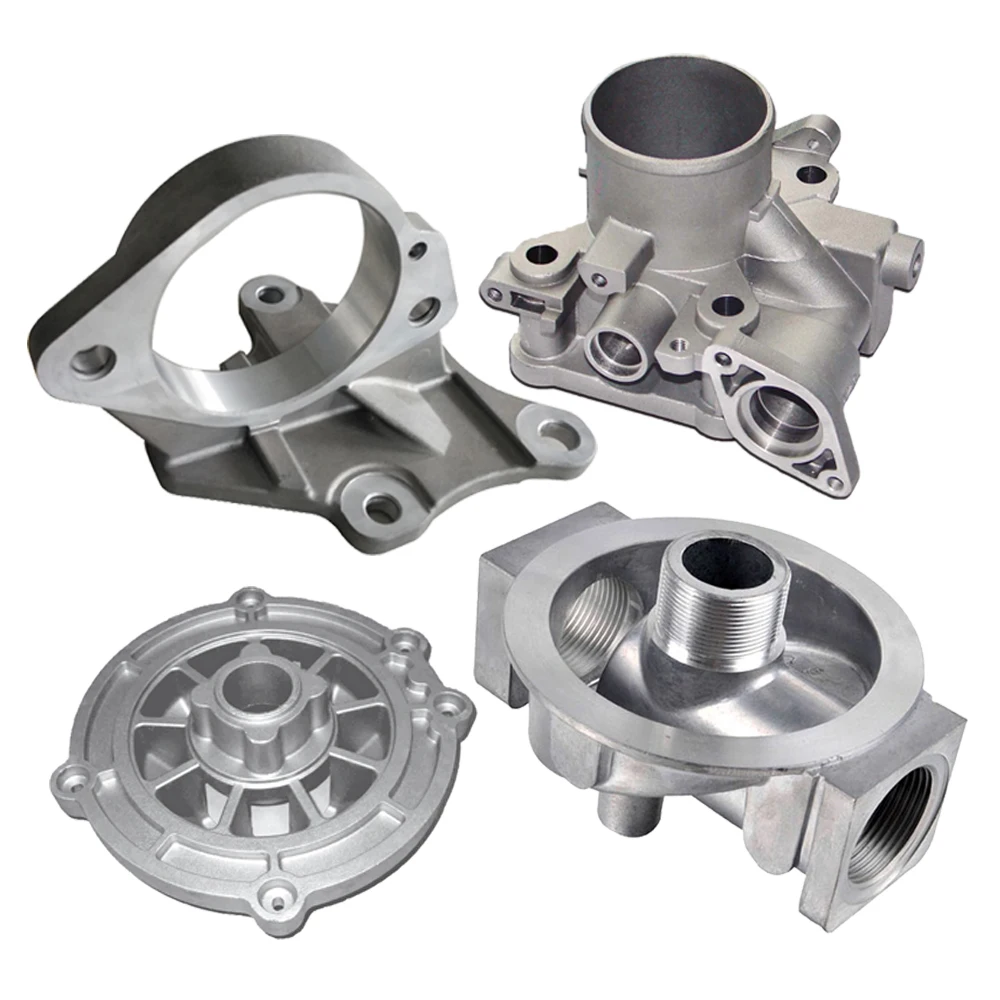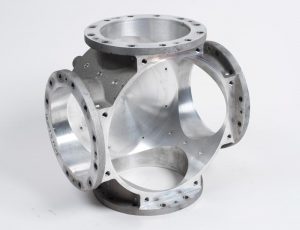Just How Light Weight Aluminum Spreading Contributes to Efficient Manufacturing Solutions
Aluminum spreading plays a crucial function in modern-day manufacturing. Its light-weight nature and deterioration resistance make it a recommended choice for numerous industries. Strategies such as die spreading and sand spreading permit the development of elaborate parts with marginal waste. The combination of automation further enhances production efficiency. The ramifications of these innovations extend past mere productivity - Aluminum Casting Company. Recognizing the wider effect reveals substantial insights into the future of manufacturing
The Advantages of Light Weight Aluminum in Manufacturing
Although various metals are utilized in production, light weight aluminum stands apart as a result of its unique buildings that improve production efficiency and product efficiency. Its light-weight nature notably reduces transport prices and energy requirements in various applications. Aluminum's superb deterioration resistance assurances longevity and sturdiness, decreasing the requirement for regular substitutes and upkeep. This steel can be conveniently formed and formed, enabling versatile design choices that fulfill specific industry demands. On top of that, light weight aluminum exhibits exceptional thermal and electrical conductivity, making it an optimal selection for applications requiring efficient warm dissipation and electrical management. The recyclability of light weight aluminum also plays a crucial role in sustainable manufacturing practices, as it can be reused without losing its fundamental properties. On the whole, the advantages of aluminum in manufacturing cause set you back financial savings, boosted item longevity, and a minimized environmental footprint, making it a favored material in various industries.
Trick Light Weight Aluminum Casting Techniques
Aluminum spreading methods are crucial for producing top quality elements in various producing processes. The key techniques consist of sand spreading, pass away spreading, and financial investment spreading. Sand casting includes creating a mold from sand, which enables for complicated forms and large elements. This method is usually preferred for its cost-effectiveness and adaptability. Pass away spreading, on the other hand, utilizes high-pressure to inject liquified light weight aluminum into steel mold and mildews, causing accurate, consistent components suitable for high-volume manufacturing. Investment spreading uses remarkable surface finish and elaborate information by making use of a wax pattern that is melted away to create the mold. Each of these strategies has certain applications and benefits, allowing producers to choose the most suitable approach based upon variables like manufacturing quantity, complexity, and product specs. By understanding these vital methods, makers can enhance their production efficiency and guarantee the stability of their aluminum parts.
Effect on Automotive Industry
As the automobile sector significantly focuses on lightweight products to boost gas performance and efficiency, aluminum spreading has become an important solution. This manufacturing procedure allows automakers to produce intricate components with minimized weight without endangering structural stability. By making use of light weight aluminum spreading, manufacturers can produce components such as engine blocks, transmission real estates, and suspension parts that are not only lighter however additionally exhibit outstanding thermal conductivity and rust resistance.
Furthermore, the convenience of aluminum casting methods allows the production of complex designs, helping with technology in vehicle aesthetic appeals and functionality. As cars come to be much more highly advanced, the capability to integrate features like innovative security systems and electric drivetrains becomes important.

Aerospace Applications of Aluminum Spreading
Aluminum spreading plays a vital duty in aerospace applications by allowing the production of lightweight structural elements that enhance fuel efficiency. In addition, the accuracy of light weight aluminum casting enables for the development of complex engine parts, which are necessary for peak efficiency and dependability. This mix of light-weight products and specific engineering placements light weight aluminum casting as a vital technology in the aerospace market.
Lightweight Architectural Components
In the quest for boosted performance and efficiency in aerospace applications, lightweight structural parts have actually ended up being increasingly essential. Light weight aluminum casting plays a pivotal role in this venture, giving suppliers with the capacity to produce components that are both lightweight and strong. The reduced thickness of aluminum enables significant weight decreases without jeopardizing architectural honesty, which is vital for airplane performance and gas effectiveness. In addition, light weight aluminum castings can be crafted to fulfill particular style needs, making it possible for the creation of complicated geometries that typical manufacturing methods might struggle to achieve. This versatility not only simplifies production processes but likewise adds to overall cost financial savings. As the aerospace industry proceeds to emphasize sustainability, the demand for light-weight aluminum parts is anticipated to climb, better progressing development in production.
Accuracy Engine Components
Producers increasingly count on light weight aluminum casting to create accuracy engine components for aerospace applications, driven by the product's special buildings. Light weight aluminum's lightweight nature significantly decreases total airplane weight, boosting fuel efficiency and efficiency. Its superb rust resistance assurances longevity in harsh settings, making it suitable for critical engine elements. Furthermore, aluminum casting allows for limited tolerances and elaborate styles, important for optimizing engine efficiency and dependability. The spreading procedure additionally sustains mass production, enabling manufacturers to meet high need while preserving high quality requirements. As aerospace modern technology remains to development, the function of light weight aluminum spreading in creating accuracy engine components will certainly be critical in achieving greater performance and innovation in aircraft design and functionality.
Sustainability and Ecological Benefits
The expanding focus on sustainability in manufacturing has placed light weight aluminum casting as a leading service for environmentally mindful manufacturing. This process utilizes recycled light weight aluminum, which considerably reduces power usage compared to main light weight aluminum production. By leveraging scrap steel, manufacturers can lower their carbon footprint and minimize waste, lining up with global sustainability objectives.
Additionally, light weight aluminum casting produces less harmful exhausts, adding to a cleaner environment. The lightweight nature of light weight aluminum also boosts fuel performance in transport applications, further promoting eco-friendly methods.
Moreover, the resilience and corrosion resistance of light weight aluminum bring about longer item life expectancies, reducing the need for frequent substitutes and saving sources. As markets progressively focus on lasting selections, light weight aluminum spreading attracts attention as a cutting-edge approach that not just meets production needs yet additionally sustains ecological stewardship. This dedication to sustainability positions aluminum casting as a critical player in the shift in the direction of a greener manufacturing landscape.
Cost Efficiency in Production
Price efficiency is a substantial advantage of aluminum spreading, matching its sustainability benefits - aluminum casting. The process of light weight aluminum spreading enables the manufacturing of intricate shapes with minimal waste, which is especially essential go in a competitive production setting. Making use of aluminum minimizes energy costs, as it has a reduced melting factor compared to other metals, leading to lowered power consumption throughout production
Furthermore, aluminum's lightweight properties add to lower delivery and taking care of prices, even more enhancing total cost efficiency. The sturdiness and deterioration resistance of aluminum actors products additionally mean that they require much less maintenance and replacement with time, resulting in long-lasting cost savings for producers.
Innovations in casting modern technologies, such as boosted mold and mildew designs and automation, have streamlined manufacturing procedures, decreasing labor prices and raising output effectiveness. Generally, expense efficiency in aluminum spreading plays an essential function in optimizing manufacturing procedures and supporting affordable rates strategies.
Future Trends in Aluminum Spreading
The future of light weight aluminum spreading is progressively shaped by improvements in automation and lasting material innovations. Automation innovations are expected to boost effectiveness and precision in the casting procedure, while sustainable methods aim to reduce environmental impact. Together, these trends assure to redefine production criteria and techniques within the light weight aluminum casting industry.
Automation in Aluminum Spreading
Embracing automation is changing aluminum spreading processes, leading the way for enhanced effectiveness and accuracy. Automated systems streamline manufacturing by minimizing human intervention, reducing mistakes, and enhancing throughput. Technologies such as robot arms and computer mathematical control (CNC) machines enable consistent and precise shaping of light weight aluminum elements. Additionally, smart sensors monitor various parameters in real time, guaranteeing perfect problems throughout the spreading process. This combination of automation not just reduces preparations but likewise enhances product top quality by keeping tighter tolerances. As producers increasingly embrace these sophisticated technologies, the aluminum casting market is established to experience considerable enhancements in operational effectiveness, cost-effectiveness, and competitiveness in the global market.
Lasting Product Innovations

Frequently Asked Inquiries
What Sorts Of Light Weight Aluminum Alloys Are Typically Utilized in Casting?
Commonly made use of aluminum alloys in casting include 356, 380, and 413. These alloys are favored for their superb fluidity, stamina, and deterioration resistance, making them suitable for a selection of industrial applications.
Just How Does Aluminum Casting Compare to Other Steel Casting Techniques?
Light weight aluminum casting usually supplies reduced weight, superior corrosion resistance, and better thermal conductivity contrasted to various other metal casting methods. Additionally, it permits complex styles and faster production cycles, boosting overall manufacturing performance and performance.
What Industries Advantage Many From Aluminum Spreading?
The vehicle, aerospace, and electronic devices markets profit most from light weight aluminum spreading. These industries use its light-weight, corrosion-resistant buildings to enhance efficiency, lower gas intake, and enhance general product efficiency, making aluminum casting increasingly crucial.
Exist Details Style Limitations With Aluminum Casting?
Yes, aluminum spreading has style limitations, view publisher site consisting of restrictions on wall surface thickness, complicated geometry obstacles, and prospective issues with attaining tight resistances (Aluminum Foundry). These aspects can influence the total stamina and performance of the end product
Exactly How Is Quality Assurance Maintained in Aluminum Spreading Processes?
Quality assurance in light weight aluminum casting procedures is preserved through strenuous inspections, adherence to standard procedures, and making use of sophisticated technologies. Normal surveillance guarantees dimensional precision, surface integrity, and material uniformity throughout manufacturing, advertising overall reliability.
As the vehicle market significantly prioritizes light-weight materials to boost fuel performance and performance, aluminum casting has arised as a vital remedy. Aluminum spreading plays a crucial function in aerospace applications by making it possible for the manufacturing of light-weight structural components that boost fuel effectiveness. Price effectiveness is a substantial advantage of light weight aluminum casting, complementing its sustainability benefits. Welcoming automation is changing light weight aluminum casting procedures, leading the way for enhanced effectiveness and accuracy. Recycled aluminum usage has gained traction, considerably reducing power usage contrasted to main aluminum production.